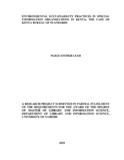| dc.description.abstract | This study sought to assess environmental sustainability practices in special information
organizations in Kenya with special reference to Kenya Bureau of Standards. The
specific objectives of the study were to establish the level of awareness creation by the
library staff on environmental sustainability practices in special information
organizations, examine environmental sustainability practices applied in the operations of
special information organizations, establish the role of information professionals in
support of environmental sustainability practices and propose possible strategies for
adoption to promote environmental sustainability practices. The study applied a mixed
method approach where both qualitative and quantitative data was collected and mixed at
analysis, discussion and reporting levels. Multiple sampling methods were used including
purposive sampling to determine the area of study, stratified random sampling to
accommodate various departments at KEBS and simple random sampling to select a
sample size of 106 respondents from a total target population of 723 staff members. In
addition, seven members of staff from six departments which had highest number of staff
were also interviewed. The study employed interview guides, questionnaires, document
analysis and observation methods to collect data from respondents. Kenya Bureau of
Standards was purposely selected for the study as the organization works with the public
to provide and ensure standardization solutions in production and manufacturing industry
for sustainable development and environmental protection. Kenya Bureau of Standards
library is based at the headquarters office and houses standardization information on
environmental protection. Quantitative data was analyzed using Microsoft Excel
application and presented in form of charts, graphs, tables of frequencies and percentages
while qualitative data was analyzed through Statistical Package for Social Sciences in
accordance to the study themes based on the objectives and research questions and
discussions were reported. Findings revealed that the level of awareness creation on
environmental sustainability practices is low since KEBS library staff have not
implemented methods of awareness creation to the users. KEBS library has not embraced
the concept of environmental sustainability to integrate green movement practices in the
library operations. There are no strategies and structures put in place to implement and
evaluate environmental sustainability practices signifying lack of awareness creation on
sustainability matters. Institutions need to create awareness on environmental
sustainability practices for staff and clients, conduct staff training, policy formulation and
implementation and frequently conduct monitoring and evaluation to ensure
implementation of the sustainability policy. Information professionals and other
stakeholders in the environment sector need to promote and support effective
implementation of environmental sustainability programs, policies and practices in
institutional operations. | en_US |



